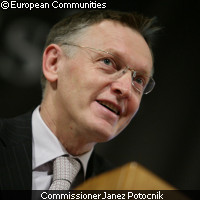African Union awards women scientists, welcomes new EU funding opportunities
On 9 September, the African Union Women Scientist Regional Awards were presented in Addis Ababa, Ethiopia. EU Commissioner for Science and Research Janez Potocnik participated in the ceremony, commending the four laureates for their role in building the 'new African Society' and addressing the problems still facing women scientists in Europe. The African Union Scientific Awards programme celebrates the achievements of women scientists through its 'Regional Women Scientific Award', and fosters career development for young scientists in the African Union (AU) Member States. In addition to rewarding outstanding scientists throughout the continent, the programme promotes efforts to transform research into entrepreneurship and attract investments to Africa. Awards valued at USD 20,000 (approximately EUR 13,700) apiece were given to four women scientists chosen from five African regions (central, eastern, northern, southern and western Africa) for their outstanding work in basic science, technology and innovation, and earth and life sciences. It is hoped that the awards will inspire more girls to pursue an education and career in science. 'Today is a relevant moment for the AU Commission to underline the importance and relevance of science as an engine for Africa's development,' said Commissioner Potocnik. 'Through this ceremony, the AUC wants to acknowledge the importance and role of the women [...] for Africa's development.' Addressing the laureates, the Commissioner emphasised that their competences and capacities extend well beyond scientific endeavour: 'You [...] are the symbol of how future challenges may be met and solutions may be found,' he said. The award acknowledges the heavy responsibility its recipients carry, to serve as role models. 'You demonstrate that all Africans, including those who may have been excluded from certain types of education or office in the past, can become recognised as the engine of development and step up your contribution. You are a standard bearer of hope to succeed despite often difficult situations. You have the capacities to demonstrate that a better society is possible,' said Dr Potocnik. While women scientists in Africa often face overwhelming obstacles to success, in Europe progress has also been hindered. 'In Europe, we are also placing more emphasis on mobilising the talents of women in research. This is borne out of the belief that no society can succeed in the long run with only half its capacities and talents directed to matters of public and socioeconomic importance,' the Commissioner explained, adding: 'If research must be relevant to society and have a real impact, it must involve all elements of that society.' Although more than 34% of European science, engineering and technology graduates are women, only 9% of professors in these fields are women. While the numbers have improved somewhat in the past few years, Dr Potocnik underlined that the figures reflect a gross waste of talent and resources. He explained that the EU has taken measures to 'promote better conditions for women to reconcile their private and professional lives, careers and families' and to ensure that the processes, instruments and criteria of research funding promote gender equality. 'During my visit to Africa, in Kenya and Ethiopia, I [...] met many women scientists and I can say that if their example is representative, Africa cannot afford to [leave] their intelligence and dynamism untapped,' Dr Potocnik remarked. On the same day, Dr Potocnik and AU Commissioner for Human Resource Science and Technology, J.P. Ezin, announced the recent launch of a call for research proposals for Africa in 2010 worth EUR 63 million. The purpose of the call is to help strengthen Africa's research base. Successful proposals to carry out projects in health, environment, food, agriculture, fisheries and biotechnology will be financed through the 'Cooperation' Theme of the Seventh Research Framework Programme (FP7). In a separate speech, Commissioner Potocnik urged African researchers to team up with EU scientists and to apply to the EUR 63 million call for proposals. Financing will be given to priority topics as identified by the African research community. The call is part of the AU-EU Scientific Partnership agreed upon in December 2007, and follows efforts initiated in autumn 2008 to implement the 'EU-AU Partnership for Science, Information Society and Space' through several flagship projects.
Countries
Ethiopia



